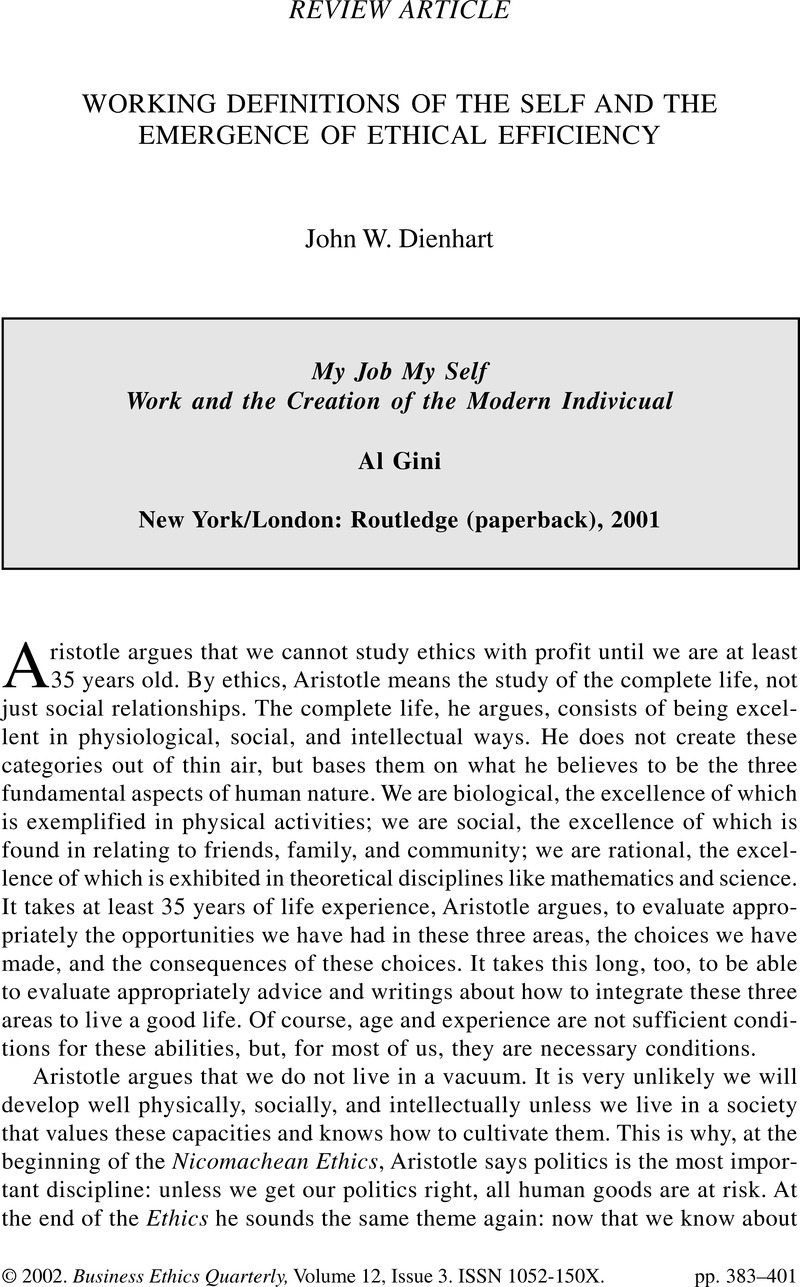No CrossRef data available.
Published online by Cambridge University Press: 23 January 2015

1 Aristotle, Nicomachean Ethics, Book 1, Chapter 3. Gini is not deliberately using Aristotle’s methodology. He presents it as a reasonable way to proceed.
2 Gini does not suggest an inference here.
3 Phillips, Robert, and Joshua Margolis. “Toward an Ethics of Organization,” Business Ethics Quarterly 9(4): 619–638.
4 The need to make this choice is relatively new. Up until a few hundred years ago, almost everyone’s tasks were prescribed for them by elders operating from tradition. While these were choices in an existential sense, the options available were few.
5 Friedman, Milton. “The Social Responsibility of Business is to Increase Its Profits” In John Dienhart. Business, Institutions, and Ethics: A Text with Cases and Readings. New York: Oxford University Press, 2000.
6 Bellah, Robert, Richard Madsen, William Sullivan, Ann Swidler, and Steven Tipton. Habits of the Heart: Individualism and Commitment in American Life. Berkeley: University of California Press, 1985.
7 Nietzsche, Friedrich. The Will to Power. New York: Vintage Books, 1967.
8 Sartre, Jean-Paul. Existentialism and Humanism. Brooklyn: Haskell House, 1977.
9 Rabinow, Paul, and Robert Hurley, eds. The Essential Works of Michel Foucault, 1954–1984. New York: New Press; distributed by W.W. Norton & Company, 1997.
10 Padover, Saul. The Essential Marx: The Non-Economic Writings: A Selection. New York: New American Library, 1979.
11 Silf, Margaret. Inner Compass: An Invitation to Ignatian Spirituality. Chicago: Jesuit Way, 1999.
12 Aquinas, Saint Thomas. Readings in the Summa Theologiae. Notre Dame, Ind.: University of Notre Dame Press, 1990.
13 Augustine, Saint. The Confessions. Hyde Park, N.Y.: New City Press, 1997.
14 Leigh, David. Circuitous Journeys; Modern Spiritual Autobiography. New York: Fordham University Press, 2000.
15 Aristotle. Nicomachean Ethics. In the Basic Works of Aristotle, ed. Richard Mckeon. New York: Random House, 1941, 1968.
16 Walzer, Michael. Thick and Thin: Moral Argument at Home and Abroad. Notre Dame, Ind.: University of Notre Dame Press, 1994.
17 The Merriam Webster On Line Dictionary <http://www.m-w.com/>.
18 Adherents to constructionist views agree that there is no independent ground on which to stand, no privileged place from which we can take the measure of other things. This, they claim, is the nature of the world. But, to make this claim seems to assume that there is a real world—the one without a privileged position. I refer the reader to Socrates and Plato’s discussion in the Theaetetus of the proposition “Man is the measure of all things,” where Socrates argues that the proposition is self-defeating.
19 Nussbaum, Martha. Women and Human Development: The Capabilities Approach. New York: Cambridge University Press, 2000.
20 Chomsky, Noam. Language and Mind. New York: Harcourt Brace Jovanovich, 1972.
21 Aristotle believed—but did not argue—that women and all non-Greeks did not have the capacity to be intellectual elites, and the most untalented human beings were natural slaves. He did not, it should be noted, define slaves in terms of skin color.
22 The reality, of course, is much different. Still, one sign of the power of a political, social, or ethical idea is that its violators seek its mantle.
23 UN Declaration of Human Rights in Dale C. White, Making a Just Peace : Human Rights and Domination Systems. Nashville: Abingdon Press, 1998.
24 Gini, p. 53.
25 Bowie, Norman. Business Ethics: A Kantian Perspective. Malden, Mass.: Blackwell Publishers. 1999.
26 Duska, Ronald. LaMont Chair of Business Ethics, The American College.
27 Gini devotes a chapter to the future of work in his book. I do not discuss this chapter here. Rather, I discuss whether critiques of business are likely to change the work environment.
28 Presentation at Society for Business Ethics, Toronto, August 2000. A student of mine pointed out that the film Jerry Maguire is an exception. In that film the protagonist pursues, in the face of great personal risk, more just and caring ways of doing business.
29 See his view on the future of the glass ceiling in the Women in the Workplace chapter. Gini thinks it is more or less a permanent fixture of organizational architecture, because the “old boys club” will keep it in place. I don’t think the club is as unified, or as powerful, as Gini thinks.
30 Bowie, op. cit., p. 73.
31 Ibid., p. 74.
32 Ibid.
33 To follow this principle back further, we should still be in hunter-gatherer tribes.
34 For more on this, see Robert Goffee and Gareth Jones “Why Should Anyone Be Led by You? Harvard Business Review, September–October 2000.
35 John Dienhart. Business, Institutions, and Ethics: A Text with Cases and Readings. New York: Oxford University Press, 2000.
36 Friedman, op. cit.
37 See Dienhart, op. cit. The definitions are stipulative, and so do not need defense. I believe they are useful, but that is yet to be seen.
38 How these four functional areas of ethics fit with the three capacities of human beings is too complicated to go into here.
39 I am interpreting Mr. Dunlap’s behavior in the most charitable way.
40 New York: Simon and Schuster, 1987.
41 Associated Press. “Audit: ‘Chainsaw Al’ Turnaround a Myth.” Posted at 12:05 p.m. PDT; Wednesday, October 21, 1998. Appeared in the Seattle Times.
42 Meetings of the Society for Business Ethics and the Social Issues in Management Division of the Academy of Management, August, 1996.